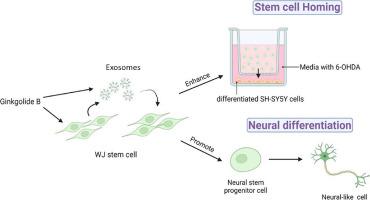Ginkgolide B promotes stem cell homing and neuronal differentiation by Wharton's jelly mesenchymal stem cell-derived exosomes in a Parkinson's disease cell model
IF 4
2区 农林科学
Q2 FOOD SCIENCE & TECHNOLOGY
引用次数: 0
Abstract
Parkinson Stem cell therapy offers potential benefits for Parkinson ’s disease (PD) through neuronal repair and functional restoration of the brain; however, its effectiveness is hindered by limited cell survival, inadequate differentiation, and low homing of the transplanted cells. Ginkgolide B (GB), a bioactive compound found in Ginkgo biloba, has neuroprotective properties. This study examined the impact of GB on Wharton's jelly mesenchymal stem cells (WJMSCs) and their exosomes for potential use in PD therapy. GB enhanced WJMSC homing by upregulating CXCR4, CXCR7, and SDF-1 while reducing OCT4 and Nanog. GB also increased neural differentiation markers, including CD133, BDNF, and phospho-IGF1-R, accompanied by β-catenin nuclear translocation. Exosomes from GB-treated WJMSCs were larger and more effective in promoting neuronal differentiation, as demonstrated by increased BDNF levels and NeuN-positive cells. These results suggest that GB enhances WJMSC differentiation and exosome function, supporting its use as an adjunct in stem cell–based PD treatments.

银杏内酯B在帕金森病细胞模型中通过沃顿果冻间充质干细胞衍生的外泌体促进干细胞归巢和神经元分化
帕金森干细胞疗法通过神经元修复和大脑功能恢复为帕金森病(PD)提供了潜在的益处;然而,其有效性受到细胞存活有限、分化不足和移植细胞归巢率低的阻碍。银杏内酯B (GB)是一种在银杏叶中发现的生物活性化合物,具有神经保护作用。本研究考察了GB对沃顿氏胶质间充质干细胞(WJMSCs)及其外泌体在帕金森病治疗中的潜在应用的影响。GB通过上调CXCR4、CXCR7和SDF-1,降低OCT4和Nanog,增强WJMSC归巢。GB还增加了神经分化标志物,包括CD133、BDNF和phospho-IGF1-R,并伴有β-catenin核易位。gb处理的WJMSCs外泌体更大,更有效地促进神经元分化,BDNF水平和neun阳性细胞的增加证明了这一点。这些结果表明,GB增强WJMSC分化和外泌体功能,支持其作为基于干细胞的PD治疗的辅助物。
本文章由计算机程序翻译,如有差异,请以英文原文为准。
求助全文
约1分钟内获得全文
求助全文
来源期刊

Journal of Functional Foods
FOOD SCIENCE & TECHNOLOGY-
CiteScore
9.60
自引率
1.80%
发文量
428
审稿时长
76 days
期刊介绍:
Journal of Functional Foods continues with the same aims and scope, editorial team, submission system and rigorous peer review. We give authors the possibility to publish their top-quality papers in a well-established leading journal in the food and nutrition fields. The Journal will keep its rigorous criteria to screen high impact research addressing relevant scientific topics and performed by sound methodologies.
The Journal of Functional Foods aims to bring together the results of fundamental and applied research into healthy foods and biologically active food ingredients.
The Journal is centered in the specific area at the boundaries among food technology, nutrition and health welcoming papers having a good interdisciplinary approach. The Journal will cover the fields of plant bioactives; dietary fibre, probiotics; functional lipids; bioactive peptides; vitamins, minerals and botanicals and other dietary supplements. Nutritional and technological aspects related to the development of functional foods and beverages are of core interest to the journal. Experimental works dealing with food digestion, bioavailability of food bioactives and on the mechanisms by which foods and their components are able to modulate physiological parameters connected with disease prevention are of particular interest as well as those dealing with personalized nutrition and nutritional needs in pathological subjects.
 求助内容:
求助内容: 应助结果提醒方式:
应助结果提醒方式:


